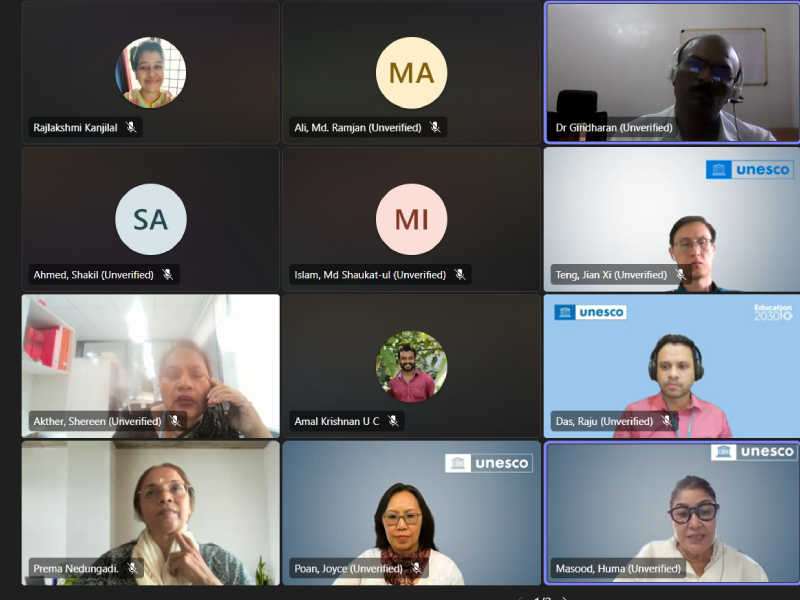
The UNESCO Regional Office for South Asia organized monthly Education Sector meetings that brought together colleagues from field offices across the region. The area of focus and theme for the month of October was Assistive Technologies, Disability Inclusion, and Inclusive Education on 14 October 2025. The meeting was chaired by Ms. Joyce Poan, Programme Specialist and Chief of Education, UNESCO Regional Office in New Delhi, and Ms. Huma Masood, Senior Gender Specialist, UNESCO.
Three UNESCO Chairs on Assistive Technologies in Education, Amrita Vishwa Vidyapeetham, Community-based Disability Management and Rehabilitation Studies, University of Calicut; and Inclusive Adapted Physical Education and Yoga, Ramakrishna Mission Vivekananda Educational and Research Institute (RKMVERI) presented their insights, achievements, and recent developments from Chair’s work in these areas.
Amrita’s UNESCO Chairholder, Dr. Prema Nedungadi, highlighted the Chair’s innovations, focusing on two projects: the AI Chatbot got UMANG platform and ISL OLabs. The Chatbot serves the deaf community by recognizing Indian Sign Language (ISL) video input for FAQ responses. Addressing the challenges faced by 63 million deaf and hard-of-hearing Indians, ISL OLabs offers interactive learning and adaptive assessment for ISL learners. These initiatives align with SDG 4 (Quality Education), SDG 10 (Reduced Inequalities), and SDG 17 (Partnership for the goals).
The UNESCO Chair for Community-based Disability Management and Rehabilitation Studies at the University of Calicut is led by Prof. Baby Shari P A. The Chair’s mission is to advance disability management and rehabilitation practices through research, special education, adapted sports, and the establishment of clinics. Key targets—including Zero rejection, Full Inclusion, and Partnerships—are aligned with several Sustainable Development Goals (SDGs): SDG 3 (Good Health), SDG 4 (Quality Education), SDG 10 (Reduced Inequalities), and SDG 17 (Partnership for the goals).
The UNESCO Chair in Inclusive Adapted Physical Education and Yoga at Ramakrishna Mission Vivekananda Educational and Research Institute (RKMVERI) is headed by Dr. R. Giridharan. The Chair promotes Inclusive Education through RCI/NCTE-approved training in Disability Management, Special Olympics, and Indian Sign Language. Key developments include a funded project for adapted boccia game, auditory sports gadgets, and a pending patent for assistive devices. This work aligns with SDG 4 (Quality Education), SDG 3 (Good Health), and SDG 5 (Gender Equality).
The collective mission of these UNESCO Chairs is clear: to harness cutting-edge technology—from AI video recognition to adapted sports equipment—to forge a fully inclusive digital society. By turning research into assistive innovation, they are actively breaking down barriers to education and participation, ensuring technology advances equity and human dignity, directly supporting SDG 4 and SDG 10.